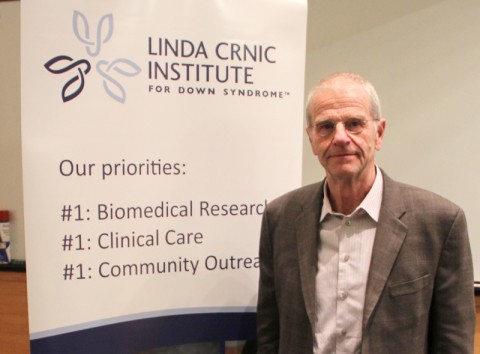Karl Pfenninger Leaves Legacy of Science
The renowned researcher passed away recently. The Crnic Institute and Global pay tribute to his instrumental work in cognition.
 Recently, we lost Dr. Karl H. Pfenninger to his battle with brain cancer. Dr. Pfenninger was one of four principal investigators at the Linda Crnic Institute for Down Syndrome and a professor of pediatrics at the University of Colorado School of Medicine. He was also director of the Colorado Intellectual and Developmental Disabilities Research Center (IDDRC), a position formerly held by Linda Crnic, the namesake of the Crnic Institute.
Recently, we lost Dr. Karl H. Pfenninger to his battle with brain cancer. Dr. Pfenninger was one of four principal investigators at the Linda Crnic Institute for Down Syndrome and a professor of pediatrics at the University of Colorado School of Medicine. He was also director of the Colorado Intellectual and Developmental Disabilities Research Center (IDDRC), a position formerly held by Linda Crnic, the namesake of the Crnic Institute.
Throughout his scientific career, Dr. Pfenninger has contributed greatly to the field of neuroscience, particularly the study of how nerves develop and make connections. In recent years Dr. Pfenninger’s work was focused on intellectual disability and how development of nerves is involved. Dr. Pfenninger’s research with Amyloid Precursor Protein (APP), a protein encoded on chromosome 21, aimed to determine how this protein, already known to be the one that triggers Alzheimer’s disease, was functioning during nerve development. His research focused primarily on studying excess expression of this protein in Down syndrome. People with Down syndrome have three copies of chromosome 21 instead of the typical two. These studies implicated the APP protein in proper functioning of developing nerves.
His laboratory has also developed a mouse that expresses excess APP to determine if this affects brain development, with the hope of better understanding whether APP over-expression in people with Down syndrome causes problems with neurodevelopment and cognition. Dr. Pfenninger was also cataloging all the proteins found in the tips of developing nerves to try to better understand the complexity of nerve growth and function.
Dr. Pfenninger was an inaugural recipient of the Crnic Grand Challenge Grant for his APP research. His lab’s results suggest that early intervention with therapies to reduce APP levels could help to ameliorate cognitive deficits in Down syndrome. Some of his most recent published research appeared in “Nature Cell Biology” in May 2014, “The SNARE Sec22b has a non-fusogenic function in plasma membrane expansion,” and in The Journal of the Federation of American Societies for Experimental Biology in January 2014, “Dosage of amyloid precursor protein affects axonal contact guidance in Down syndrome.”
Besides being a dedicated scientist, mentor, colleague, and friend, Dr. Pfenninger will be remembered for his love of travel, photography, opera, and espresso, and will be sorely missed by members of the Linda Crnic Institute for Down Syndrome, the Global Down Syndrome Foundation, and the rest of the research community.
Recent Posts
- GLOBAL LEADERS – An Exclusive Interview with Erin Suelmann, Executive Director of the Down Syndrome Association of Greater St. Louis
- Sleep Apnea Across the Lifespan in People with Down Syndrome
- Government Profiles: Robert Aderholt (R-AL) & Tammy Baldwin (D-WI)
- Connor Long & Josh Peck: A GLOBAL Bromance
- GLOBAL Launches Pilot Fitness Program using Mann Method PT

 Experience our inspirational and groundbreaking videos and photos. Our children and self-advocates are beautiful AND brilliant!
Experience our inspirational and groundbreaking videos and photos. Our children and self-advocates are beautiful AND brilliant! Make sure your local Representatives are on the Congressional Down Syndrome Task Force.
Make sure your local Representatives are on the Congressional Down Syndrome Task Force.